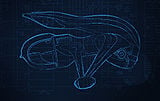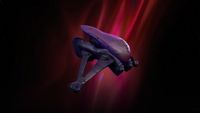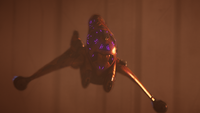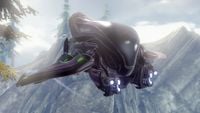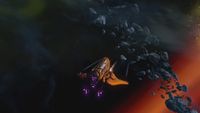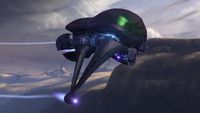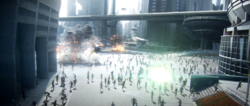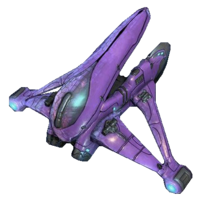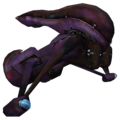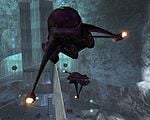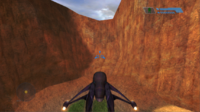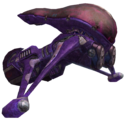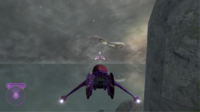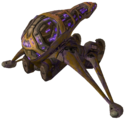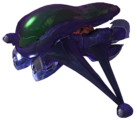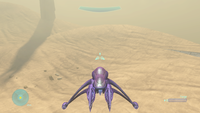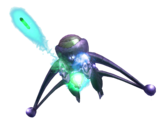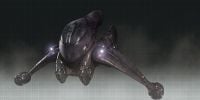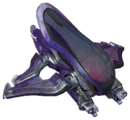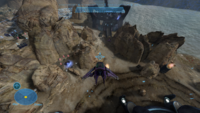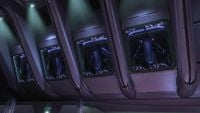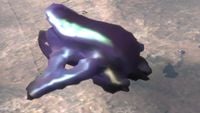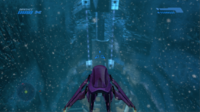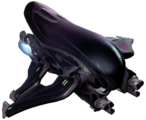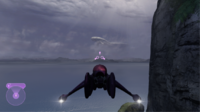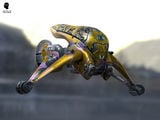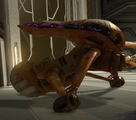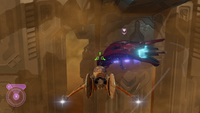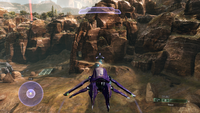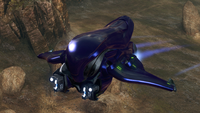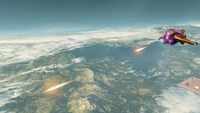Type-26 Banshee
From Halopedia, the Halo wiki
The Type-26 Ground Support Aircraft, more commonly known as the Banshee, is the Covenant's standard ground assault aircraft.
Specifications
Design details
The Banshee is a versatile single-pilot ground assault aircraft. It is usually piloted by Sangheili, though Jiralhanae pilots became common after the outbreak of the Great Schism. The cockpit, in which the pilot rests prone, is encased in a curved, reflective cowling with no discernible windscreen. Though the Type-26A and Type-26C variants leave the pilot partially exposed (particularly the feet and lower legs), the Type-26B version features an enclosed cockpit and thus is capable of space flight with the proper modifications.[1][2]
The craft has two wing canards, each of which terminates in a boosted gravity propulsion drive including a jet and an anti-gravity pod; these leave a vaporous exhaust trail behind the Banshee. The craft is capable of achieving a velocity of over 100 kilometers per hour (62 mph).[3][note 1] The Banshee is capable of performing complex maneuvers such as aileron rolls and flips. The Banshee is also capable of hovering, though this ability is not often used.[note 2]
Armament
The Banshee sports two weapon pods attached underneath the fuselage; each pod contains a Class-2 plasma cannon capable of firing in the 100-250 kilowatt range and a Class-2 fuel rod cannon.[4][5] The plasma cannons are deadly to infantry; one bolt can instantly kill a lightly armored target. Armored targets such as the M808 Scorpion MBT can withstand only a few bolts before being destroyed. A direct hit from the Banshee's fuel rod cannon is almost invariably fatal, even to armored infantry. Repeating plasma cannons, which have a greater rate of fire than the standard armament, can be installed at the front of the anti-gravity pods.[6]
Variants
Several variations on the standard design exist, though combat performance is fairly standard among all variants. A given craft's architecture is based on its functionality,[7] the year in which is manufactured, the branch to which it belongs,[8] and even the aesthetic preference of the one who commissions the craft.[7] Amphibious attack and escort Banshee variants were commissioned throughout the Covenant's history for the Covenant's oceanic installations and during deep-sea artifact retrieval missions, although they have rarely been encountered by the UNSC.[7]
- T-26A: The first Banshee variant categorized by the Office of Naval Intelligence following the conflicts on Harvest, the T-26A was encountered by UNSC forces in many engagements.[7]
- T-26AZ: The T-26AZ used in select artifact-hunting fleets. Some were deployed alongside Sesa 'Refumee's contingent on the gas mine over Threshold in 2552. The significance of its design is unknown to human researchers.[7]
- T-26B: A technologically advanced variant of the Type-26 Banshee that saw limited service with the Covenant military prior to the Human-Covenant War, the T-26B began to see widespread use in the war around 2550 after human forces diminished the Covenant's stock of older models. Many T-26Bs were commissioned by Jul 'Mdama after the Covenant War for use in his reformed Covenant faction.[7] The T-26B can be modified to operate in space.[1][2]
- T-26BZ: An ordained model of the T-26B, the T-26BZ is believed to have been the chosen model of Loka 'Bandolee, a Sangheili artifact hunter under Sesa 'Refumee's command.[7]
- T-26C: The T-26C was the standard model utilized by the Prophet of Truth's forces during the Battle of Earth and the Battle of Installation 00 in late 2552.[7]
- T-27 Exoatmospheric Multirole Fighter:: Commonly known as the "Space Banshee", the Type-27 XMF is a space-capable, vacuum-rated model designed to support the more powerful Type-31 Seraph and to screen against enemy single ships.[9][10][11]
Operational history
The Banshee was first used among Sangheili exploratory fleets prior to their war with the San'Shyuum. The Banshee's design is based on the 'sKelln, a predatory aerial animal native to Sanghelios. The earliest model of the Banshee was the Uztet'sKelln, which, along with other early models, was often used by the Covenant Honor Guard; Sangheili kaidons often commission such craft as their personal transports. The QezoY'asabu ("Obsidian Wing") is another ancient iteration used in stealth operations by Covenant Special Operations units. It is equipped active camouflage and sensor bafflers.[7]
After the retaking of Harvest in 2526 by Admiral Cole, the Covenant, attempting to scout and recover an artifact, deployed multiple T-26A Banshees to scout areas of interest and slow down advancing enemy forces, during the assault on Harvest.
In 2531 during the first assault on the colony world Arcadia, T-26A Banshees were used with Type-29 Vampires to destroy human held positions, killing and causing panic among civilians attempting to flee the Covenant invasion. In addition the Banshees were used against UNSC military forces attempting to assist with evacuation efforts. During the Battle of Shield World 0459 the Covenant would deploy T-26A Banshees in efforts to stop not only the crew of the UNSC Spirit of Fire, but also the Flood and Sentinels too.
As the war dragged on, ground campaigns conducted by the Covenant continued to employ the Banshee as their main attack aircraft. During the assault on Algolis T-26C Banshees were called in to weaken military forces attempting to protect and destroy valuable data. The UNSC was able to hold off the Covenant just long enough and all ground forces were eventually destroyed with the detonation of a nuclear weapon attached to a prototype armor suit.
Late into the war in 2552, the Covenant launched a surprise assault on Reach, humanity's heavily fortified epicenter of military and economic power outside of Earth. Multiple squadrons of T-26B Banshees were employed to scout and inflict casualties on civilian and military forces alike. However when the UNSC Pillar of Autumn escaped, many Covenant ships followed to destroy the Pillar of Autumn. Upon exiting Slipspace, the Pillar of Autumn arrived at Installation 04 and met with multiple enemy contacts. With the Magnetic Accelerator Cannon offline and sustaining extensive damage across all systems, the Pillar of Autumn was forced to crash land on to the construct. Covenant forces deployed T-26B and T-26C Banshees in order to hunt down the remaining UNSC personnel who escaped onto the ring and later engage both Flood and Sentinel forces.
During the opening of the Battle for Earth, Regret's carrier Solemn Penance managed to land in the city of New Mombasa and deploy T-26A and T-26B Banshees. T-26A Banshees were utilized in engaging John-117's M808B Scorpion in an attempt from the Covenant to stop him from getting to sections of the tunnels. With the UNSC entering the city and civilians cut off the Covenant began systematically destroying anything they could before the Prophet of Regret's ship jumped out of New Mombasa destroying parts the city. In the aftermath of Regret's retreat, the full scale invasion of Earth began, the Prophet of Truth's Jiralhanae led forces laid waste to many parts of the planet and T-26C Banshees were employed to aid the Covenant in their assault.
During the Raid on the Threshold gas mine Sesa 'Refumee's heretics utilized several T-26AZ Banshees against the Covenant Special Operations group led by Arbiter Thel 'Vadamee and Special Operations Commander Rtas 'Vadumee.
As the Battle for Earth raged on John-117, with the full support of the UNSC In Amber Clad, launched a counter-strike against Regret who had jumped to Installation 05. T-26A Banshees were deployed in the same manner as they had on Earth. The subsequent outbreak of the Flood and internal conflict that consumed the Covenant however left all involved to fend for themselves, after the conclusion of the battle for Installation 05 the Covenant reorganized and made a final push offensive on Earth.
With the uncovering of the Portal at Voi the Covenant moved all their troops and armor to prevent the UNSC military from getting close to it. They deployed T-26C Banshees in the remnants of Voi to dispatch military forces attempting to break through their formation. This task was ultimately accomplished. After the opening of the portal and the arrival at Installation 00 the Covenant deployed all their assets in a last ditch effort to stop humanity and activate the remaining Halo installations. T-26C Banshees were used wherever possible to halt the UNSC and Swords of Sanghelios advance towards the Citadel. The Banshees failed to accomplish this mission and as a result, marked the end of the Covenant.
During the post-war era, T-26 Banshees continued to be used extensively by the various Covenant remnants, although the Hesduros-pattern Type-54 Banshee was also adopted to widespread usage within the major splinter factions. T-26B Banshees were popular during War Games matches aboard Anvil Station and the UNSC Infinity. During the Battle of Draetheus V Merg Vol deployed multiple T-26A and T-26C Banshees to support his troops. Many T-26B Banshees were seen in action in use by Jul 'Mdama's Covenant remnant during the Battle of Requiem and Requiem Campaign, in 2557 and 2558 respectively. 'Mdama's troops used T-26A Banshees during the Battle of Installation 03.[12] During the Battle of Ealen IV Vata 'Gajat's mercenary group deployed several T-26B and T-26C Banshees against the peace delegation.
Gameplay
Advantages
The Banshee is an extremely agile aircraft. Under the control of an experienced pilot, it can be extraordinarily difficult to destroy, making it an easy way to penetrate enemy lines and harass enemy infantry. The Banshee's plasma cannons are highly efficient at killing individual soldiers, and a single fuel rod can eliminate an entire group of infantry. The boosting capability of the vehicle allows for quick entry and exit from combat situations, or to catch up with a particular target. Boosting and evasive abilities allow a pilot to outpace a homing projectile or slip away from opposing vehicles and small arms fire. By utilising aileron rolls and flips, the Banshee is able to avoid slow-moving projectiles at medium or long ranges, while also facilitating quick turns around obstacles or close threats. As a support aircraft, the Banshee is able to pin down enemy forces until ground forces can move in, or destroy light structures that may be obstructing ground forces from advancing.
Disadvantages
The Banshee is lightly armored and, thus, vulnerable to high velocity rounds, explosives, anti-vehicle weaponry, and even small arms fire from human projectile weaponry. The Banshee's low flight ceiling makes it very vulnerable to weapons like the M41 Light Anti-Aircraft Gun, which can easily punch through the armor of the Banshee and injure or kill the pilot. The Banshee is also vulnerable to EMPs, which can disable the craft temporarily.
Banshee variants that are not vacuum-sealed leave the pilot exposed from the rear, and the small gap between the cowl and fuselage can be exploited by a highly skilled sniper. Linda-058, one of the UNSC's best snipers, is known to have achieved such a shot.
The Banshee also cannot reverse unlike most aerial vehicles, forcing round trips to be made.
Changes from Halo: Combat Evolved to Halo 2
- The Banshee is now capable of hovering in midair.
- The Banshee, as well as all the other Covenant vehicles, no longer has a health bar.
- The ability to boost the Banshee's engines was added, at the cost of maneuverability and weapon power. Overall, a Banshee that is not boosting moves at a slower velocity than in Halo: Combat Evolved.
- The ability to hijack an occupied enemy Banshee has been added.
- The Banshee is more maneuverable and capable of performing tricks, allowing it to strafe more effectively.
- High-velocity impacts will now injure the Banshee's pilot.
- The Banshee's plasma cannons are now more accurate but the bolts only travel half as far before dissipating.
- Banshees can no longer be flown backwards.
- The fire from the cannons is no longer linked and now fire alternately instead of simultaneously.
Changes from Halo 2 to Halo 3
- The Banshee's boosting velocity has been increased.
- The Banshee's fuel rod cannon can now be used in multiplayer matches.
- The Banshee can no longer face any lower than 45 degrees to prevent it from overpowering ground players.
- The Banshee's wings cannot be fully shot off; canonically, without anti-gravity pods, the Banshee would not be able to stay aloft.
Halo Wars
The Banshee appears in most Halo Wars levels and can be used by players in skirmish mode who play as any one of the Covenant leaders. It can be built at the Summit with 200 resources. The Banshee has three available upgrades:
- Boost: Enables the speed boost special ability.
- Requirements:
- 200 resources
- Tech level 1
- Requirements:
- Repeating Cannon: Increases fire rate of cannons.
- Requirements:
- 400 resources
- Tech level 2
- Requirements:
- Sacrifice: When critically damaged, the Banshee attempts to crash into ground targets and inflicts AOE damage.
- Requirements:
- 700 resources
- Tech level 3
- Requirements:
The Banshee is effective against most vehicles and some ground troops. It is capable of hovering like in Halo 3: ODST and is the fastest unit in Halo Wars. A common strategy is to create an army of about twenty Banshees and swarm the opposing army, especially if their forces are mainly composed of vehicles. Banshees are extremely vulnerable to Wolverines or Vampires.
Changes from Halo 3 to Halo 3: ODST
- The Banshee now hovers when it is not moving.
- The Banshee can now face nearly completely downwards.
- The Banshee can now rotate 360 degrees in mid air.
- The fuel rod projectile does not arc downward when fired.
Changes from Halo 3: ODST to Halo: Reach
- The Banshee's wings are larger than its previous incarnations and can move individually.
- The Banshee's wings now turn in the direction the Banshee moves, acting like ailerons.
- The Banshee can no longer hover in place.
- The Banshee's tricks now cannot be used as often as in Halo 2 and Halo 3.
- A boost limit has been imposed.
- The Banshee now has two separate reticules for the fuel rod cannon and twin plasma cannons. The 'switch weapons' button (default 'Y') toggles which weapon is armed.
- The Banshee's fuel rod cannon can now home in on other vehicles, as well as any Shades or support weapons that are still mounted. To compensate for the fuel rod's ability to home in on vehicles, the velocity of the projectile has been severely reduced, so much so that a Banshee can actually go faster than its projectile.
- The Banshee now has a closed canopy so the pilot's legs can no longer be seen.
- The Banshee's hull is sturdier and is able to withstand two plasma grenade sticks.
- A Sniper Rifle can now be used to shoot the pilot through the tiny crack between the Banshee's body and canopy, as Linda-058 did in Halo: First Strike. Doing so will not damage the Banshee.[13]
Changes from Halo: Reach to Halo 4
- Acrobatic maneuvers are much slower and more cumbersome.
- The gap between the front and back wing sections is far larger, in a style reminiscent of pre-Reach models.
- The fuel rod cannon no longer locks on to vehicles and turrets.
Changes from Halo 4 to Halo 2: Anniversary
- Like the original Halo 2 multiplayer Banshee the Halo 2: Anniversary multiplayer Banshees are unable to use a fuel rod cannon.
Trivia

|
Browse more images in this article's gallery page. |
- In Celtic mythology, a banshee is a female spirit who wails for the death of a particular person before they die. Banshees must steal souls from people to continue their existence. The high-pitched sound made by the Covenant Banshee is a reference to this, especially while performing tight maneuvers making it easy to hear them before one sees them. This also fits the theme of Covenant vehicles, with the exceptions of the Scarab and the Locust, being named after supernatural entities.
- In Halo: Reach, on the Firefight map Holdout, AI Banshees have been known to abruptly dive and boost straight into one of the platforms at full speed, destroying the Banshee, and often killing a player in the process. It is unknown whether this is a programmed "suicide attack" or a glitch. Oddly enough, the Banshees at the start of the campaign level Tip of the Spear have also been know to do this, even though they are scripted to destroy the warthog and fly away.
- The Banshee can be obtained as an avatar prop by purchasing the Halo: Reach controller for the Xbox 360.
- Skyjacking a Banshee in Halo: Reach campaign will reward the player the achievement "Banshees, Fast and Low".
- Banshees use anti-gravity pods on the ends of their wings to fly. However, in Halo 2, and appearing again in Halo: Reach a Banshee can have both of these pods shot off and still fly normally. It is unknown if Bungie intended for the Banshees to have an emergency propulsion system, or if this was simply overlooked in the making of the game.
- On the cover of the Halo: Combat Evolved, the two Banshees appear to be un-piloted as the top canopy enclosing the pilot is up. Also, the two Banshees that shot down Foehammer in the level The Maw also had open canopies. These were probably related to the Banshee's scripted movements.
- In Halo: Reach, if a player shoots or melees the Banshee to its damage threshold and attempts to turn the vehicle in the air, the Banshee will be unable to turn in midair because there are no wings to support its turns. It is possible that the pilot relies on the Banshee's rudders and the player's body weight when at this critical degree of damage.
- In Halo: Reach, with enough precision a rocket can be shot through the crack between the cockpit and hull and not harm the Banshee.[14]
Gallery
Normal Gallery
A T-26A Banshee in Halo: Combat Evolved.
Two T-26A Banshees near Halo Installation 04's control room.
HUD of the T-26A Banshee on Blood Gulch in Halo: Combat Evolved.
A T-26A Banshee in Halo 2.
A T-26C Banshee in Halo 3.
HUD of the T-26C Banshee on Sandtrap.
A T-26A Banshee from Halo Wars' announcement trailer
- Banshee HW.jpg
In-game screenshot of an upgraded T-26A Banshee in Halo Wars.
A T-26B Banshee in the Halo: Reach Beta.
- Boom Banshee!.jpg
A T-26B Banshee retreating after firing its fuel rod cannon.
T-26B Banshees stored in a SDV-class heavy corvette hangar.
A T-26B Banshee in Halo: Combat Evolved Anniversary.
A view of the T-26B Banshee in Halo 4.
- Halo 4 Banshee.png
Render of the T-26B Banshee in Halo 4
- H4-T26BansheeGSA-Closed.png
A T-26B Banshee in Halo 4.
HUD of the T-26B Banshee on Ragnarok in Halo 4.
- Thorne hijacks Banshee.png
Gabriel Thorne hijacks a T-26B Banshee in Halo 4's Spartan Ops.
A Type-26C Banshee and Type-27 Banshee Fighter piloted by Captain Thomas Lasky and Spartan Naiya Ray during the Battle of Ealen IV.
HUD of the T-26A Banshee in Halo 2: Anniversary.
T-26AZ Banshees on the Threshold gas mine.
HUD of the T-26B Banshee on Bloodline in Halo 2: Anniversary multiplayer.
- H2A-T26B1.png
A T-26B Banshee performing a backflip.
- H2A Heretic Banshee.png
A T-26BZ Banshee in Halo 2: Anniversary multiplayer.
- H2A-T26BZHUD.png
HUD of the T-26BZ Banshee on Bloodline.
A T-26BZ Banshee firing its orange-colored plasma on Skyward.
T-26A and T-26B Banshees in a picture of John-117 taken by Benjamin Giraud.
- T26AorC.png
T-26A Banshees on Sanghelios.
List of appearances
Note
- ^ The Art of Halo (page 128) list the Banshee's maximum flight ceiling as being estimated to be between 100 and 300 meters; Halo: First Strike (page 27, 2003 edition) also places the Banshee's flight ceiling at "about three hundred meters". Halo 2 shows Banshees operating roughly midway to the top of High Charity's dome (a height of several kilometers) as well as in the upper atmosphere of a gas giant. Halo 4 reveals that modified Type-26 Banshees can operate even in space, making the original data suspect.
- ^ The Banshee's inability to hover in most games is more likely a gameplay conceit than an element of canon. Presumably all versions of the craft are capable of hovering.
Sources
- ^ a b Cite error: Invalid
<ref>tag; no text was provided for refs namedH4VG - ^ a b Halo 4, campaign level Dawn
- ^ Cite error: Invalid
<ref>tag; no text was provided for refs namedENC - ^ Halo: The Flood, page 51
- ^ Cite error: Invalid
<ref>tag; no text was provided for refs namedmanual - ^ Halo Wars
- ^ a b c d e f g h i Halo Waypoint: Banshee
- ^ Halo: The Essential Visual Guide, page 18
- ^ Halo Waypoint: The Universe - Tech
- ^ Halo: Reach, campaign level Long Night of Solace
- ^ Halo Waypoint: Banshee Fighter
- ^ Halo: Spartan Strike
- ^ YouTube: Halo Reach - Banshee Vital Spot
- ^ YouTube: Achievement Hunter : Halo: Reach - Fails of the Weak Volume 66
